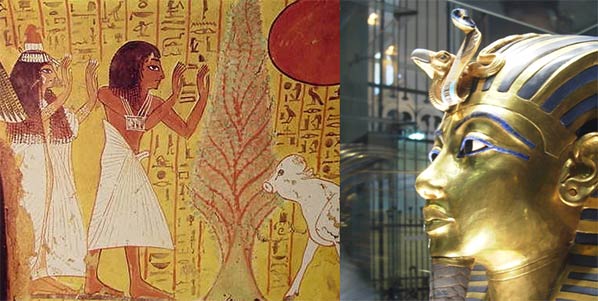In the previous post – “The Fall -What it wasn’t” we dismissed the idea that Adam and Eve were trying to become like God in a “divinity” grab or some form of status upgrade. We also saw that it is a good thing to desire the knowledge of good and evil. So what did they do wrong? On a superficial level their eating of the fruit was a simple act of disobedience. In this post we’ll take a closer look to see if we can shed some light on this topic.
When my offspring were little, they would sometimes defy us. This is natural and normal and I think we’d have worried if it hadn’t happened. We went through a time of putting them on the naughty step for their age in minutes. Once I was caught out and spent a glorious 40 something minutes of absolute peace with nothing to do. It was bliss. Punishment can backfire!

One of the hard bits about parenting is knowing how to discipline without going over the top. We’ve all seen parents doing just this and the last thing we want to do is judge them. Whatever my children did though I certainly wouldn’t punish them with disinheritance, cursed work, damaged relationships, perpetual strife, pain in child-birth and banishment.
Given that God knew this would happen wouldn’t you say that the punishment does not appear to fit the crime? Me too. Something way beyond just breaking a simple boundary must be at play here.
In Praise of Boundaries
In his helpful book ‘Falling upwards’, Richard Rohr writes about how important boundaries are. As a ex-teacher I know how pupils moan about teachers with clear boundaries and expectations and who follow these through with sanctions. However, when you dig a bit you discover that these are often the most successful educators – and they barely need said sanctions. Rohr suggests that it goes even further, and that without boundaries children grow into adults with issues, citing Yahweh’s prohibition to Adam and Eve as a clear example of this. This sheds important light onto the question of why God would put that tree there knowing that Adam and Eve would push at the boundaries. This was one tool by which their growth was to been accomplished.[1]
Never Forget
Adam and Eve were in the image and likeness of God which we have said is much more than just some tweak to our emotions or thinking that sets us apart from the rest of creation. There was divinity within the parents of our race. We are divine by orgination because God breathed into the dust and it became animated. [2] This identity bought a special intimacy with God and an understanding of the knowledge of good and evil through that intimacy. Through that intimacy, and their commission, Adam and Eve were to develop into something even greater than they already were.
As they ate the fruit so Adam and Eve either forgot, or scorned what they were created as and who they were going to be. Imagine the glory that they would have become – its is simply breath taking. Forgetting their identity put a stop to this. Going after the immediacy of a down-load rather than growth with Yahweh ‘altered the plan’ as it were. [3]
The temptation of the serpent is therefore very serious became it is attempting to get Adam & Eve to question their very being and essence (their ontology). Notice too that it not about their roles – yet – but their being. The serpent is trying to get Eve to aspire to something she already is. “You will become like Gods” he says, to a creature who shares God’s DNA. It reminds me of the Prodigal Son who plans to work his way back into his father’s good books when he is already fully accepted.
This is not the sin of thinking too highly of themselves. It is the complete reverse of this. They are not thinking highly enough of themselves. ‘Being is becoming’ as Lacoque succinctly puts it. The mere fact of our first parents ‘being’ meant that they were to ‘become’ something. ‘Changed from glory into glory’ as Paul puts it. Lacoque continues:
The conception here is highly dramatic. The biblical Adam and Eve are in a thrust towards their own identity, towards their full being. When this thrust is thwarted or aborted, they are destined to remain forever an empty promise, an unfulfillment” [4]
It is hard to overplay the seriousness of this. This is where theology becomes life-changing….
Fulfill their Calling
We have seen the Garden of Eden was an archetypal temple. This ‘proto-temple’ was to be expanded outwards into the chaotic half-creation, thus filling the entire earth with the knowledge and presence of God. They forfeited their gifting to extend paradise, and they failed to exercise their royal responsibility to have dominion over creation when they allow the unclean serpent into Eden, rather than ejecting it.
The outward expansion of what would have literally been heaven, an idyllic paradise over the whole earth could now not be fulfilled as a rift had opened between God and his highest creation. (more below). Clearly the true mission of Adam and Eve, and by extension their children, was no longer attainable. During this process they would have gained the knowledge of good and evil. We see other Old Testament characters like David and Solomon gaining this knowledge through proper means. Adam and Eve gave into the serpent’s suggestion to circumvent God’s ordained methods.
Previously they had experiential knowledge of only good. Now they no longer had just head knowledge of evil. This in turn meant that a rift between creation and humanity also developed; thus the transformation of the chaotic inhospitable land outside Eden became much, much harder.
Idolatry
It is inherited theology to suggest that idolatry for moderns is about ‘working too hard’ or ‘sports’ or ‘music’ or some such thing that takes the place of God. There may be some truth in this. The bible however seems to have a much clearer idea of what idolatry is. Up until this point Adam and Eve exercised their trust in God. They experienced intimacy of relationship with him. Now they have taken their trust away from the true source of life, and put it into a serpent and a tree.

We saw previously that idols were seen as actual manifestations of the god they portrayed and not just lifeless statues. The worshiper was therefore projecting onto the statue something that is was not. A similar thing is happening here. Adam and Eve are projecting their hopes and aspirations onto the tree and the serpent. This act brings them shame as they try to cover up.(Gen 3:7-10) Interestingly, the Hebrew bible regularly links shame to idolatry. (Ps 97:7, Isa 42:17, Jer 14:10)
This projection is the source of idolatry [5] is therefore the first act of idolatry. They looked to meet their natural, good desires from the created serpent and the created tree, rather than place them into/onto the one and only true source of truth and life – Yahweh.
As you may know trees and snakes/serpents feature a great deal in the worship of the surrounding nations as you can see in the Egyptian images above. Here the authors of Genesis are in effect giving us the final irony. God’s divine creation turns its back on the only true source of life, and places its trust into a chaotic half-creation in the form of a serpent and a tree. They have had access to the only uncreated being, whom they turned aside from in favour of created things which they therefore end up worshiping just like the surrounding nations. As you may also know this was going to become a perennial issue for Israel and it has been flagged up from the start. (1 Kgs 15:13, 2 Kgs 18:4 and many others)
Like a pack of cards falling over when one is dislodged this idolatry further feeds into their relinquishing of their own identity. This is a natural outworking as they have bought Yahweh down to the level of the created, so they are reduced too.
Adam and Eve not recognising their divine status points to the root of all our issues:
The serpent’s never telling the woman to transgress but rather undermining God’s trustworthiness and truthfulness and leaving her to draw her own conclusions points to the real core of human alienation from God and the real root of disobedience – not that God and humans can no longer converse, but rather the difficulty that the human heart and mind can have in genuinely trusting God as wise creator and living accordingly [6]
So we can see that there are several issues at play. Foundational here are issues revolving around trust which expressed itself in idolatry. They did not trust the identity they were created with, nor Yahweh’s ordained methods for their growth. They did not exercise Yahweh’s edict to subdue and have dominion over the chaotic half creation. In my experience this trust issue is still very much alive and well in me.
In the next post I aim to unpack the consequences of the fall, or some of them!
References
- Rohr goes onto suggest that in fact that suffering was part of the plan since it is an essential teacher and helps in our maturing. Clearly this is true.
- Lacoque, The Trial of Innocence. Adam, Eve and the Yahwist, 2006
- Though of course this is open to discussion. I think that if God knows all things then the plan was not changed. Open Theists might disagree
- Lacoque, Trial, p.63-64.
- Crispin Flectcher-Louis, Creation and Worship lecture notes, Westminster Theological Centre, 2011
- Moberly “Did the Interpreters Get it Right? Genesis 2-3 reconsidered”, p.37.



